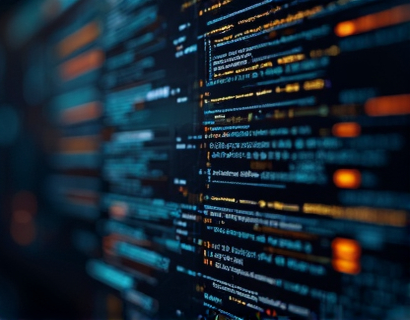AI and Crypto: Transforming Digital Finance with Intelligent Solutions for the Future
The intersection of artificial intelligence (AI) and cryptocurrency is revolutionizing the financial landscape, offering unprecedented opportunities for innovation and efficiency in digital finance. This convergence is not just a technological advancement but a paradigm shift that is redefining how we perceive and interact with financial systems. As tech-savvy crypto enthusiasts and innovators, understanding this synergy is crucial for harnessing the full potential of the future financial landscape.
The integration of AI into cryptocurrency and blockchain technology has given rise to intelligent, automated, and personalized financial solutions. These solutions are transforming traditional banking and financial services, making them more accessible, secure, and efficient. The synergy between AI and crypto is creating a new era of digital finance, one that is characterized by enhanced security, reduced transaction costs, and improved user experiences.
Enhanced Security Through AI
One of the most significant benefits of AI in the crypto space is the enhancement of security measures. Traditional financial systems are often vulnerable to fraud, hacking, and other cyber threats. AI algorithms can detect and prevent these threats in real-time by analyzing patterns and anomalies in transaction data. Machine learning models trained on vast datasets can identify suspicious activities and flag them for review, significantly reducing the risk of financial crimes.
Moreover, AI-powered security solutions can adapt to new threats as they emerge, ensuring that security measures remain robust and up-to-date. This dynamic approach to security is particularly important in the crypto world, where the decentralized and transparent nature of blockchain technology can sometimes expose systems to vulnerabilities. By leveraging AI, financial institutions and crypto platforms can safeguard user assets and maintain trust in the system.
Efficient Transaction Processing
AI is also transforming the way transactions are processed in the crypto ecosystem. Traditional banking systems often suffer from slow transaction times and high fees, especially for cross-border payments. In contrast, blockchain technology, when combined with AI, can streamline transaction processing, making it faster and more cost-effective.
AI algorithms can optimize the routing of transactions across the blockchain network, reducing congestion and lowering transaction fees. Smart contracts, powered by AI, can automate and enforce contractual obligations, eliminating the need for intermediaries and further reducing costs. This efficiency is particularly beneficial for businesses that rely on frequent and timely transactions, such as international trade and supply chain management.
Personalized Financial Services
The integration of AI in crypto finance is enabling the creation of highly personalized financial services. Traditional banking often relies on one-size-fits-all approaches, which can be inadequate for the diverse needs of modern consumers. AI-driven platforms can analyze user data to provide tailored financial advice, investment strategies, and product recommendations.
For instance, AI-powered robo-advisors can assess an individual's financial goals, risk tolerance, and market conditions to create customized investment portfolios. These advisors can continuously monitor and adjust the portfolio based on real-time data, ensuring that users always have the best possible strategy. Similarly, AI can help users manage their crypto assets by providing insights into market trends, predicting price movements, and suggesting optimal buying and selling times.
Improved User Experience
The user experience in digital finance is being significantly enhanced through AI and crypto integration. User interfaces are becoming more intuitive and user-friendly, thanks to AI-driven design and personalization techniques. Natural language processing (NLP) enables chatbots and virtual assistants to understand and respond to user queries in a human-like manner, providing 24/7 support and guidance.
Additionally, AI can analyze user behavior and preferences to offer a seamless and customized experience. For example, a crypto exchange can use AI to recognize a user's trading patterns and suggest relevant tools and features, such as advanced charting options or custom alert systems. This level of personalization not only improves user satisfaction but also increases engagement and loyalty.
Regulatory Compliance and Transparency
One of the challenges facing the crypto industry is regulatory compliance. The decentralized and anonymous nature of cryptocurrencies can make it difficult for regulators to monitor and enforce rules. AI is playing a crucial role in addressing this issue by providing tools for real-time monitoring and compliance checking.
AI algorithms can analyze transaction data to ensure that it adheres to regulatory standards, flagging any suspicious activities that may violate laws or regulations. This not only helps in maintaining the integrity of the financial system but also builds trust among users and stakeholders. Moreover, AI can facilitate the creation of transparent and auditable records, making it easier for regulators to oversee crypto operations and ensure compliance.
Innovative Financial Products
The combination of AI and crypto is giving birth to innovative financial products that were previously unimaginable. Decentralized finance (DeFi) platforms, for example, are leveraging AI to offer a wide range of financial services, from lending and borrowing to insurance and derivatives trading. These platforms use smart contracts and AI algorithms to create automated, trustless, and efficient financial systems.
AI-driven predictive analytics can also enhance trading and investment strategies. By analyzing historical data and real-time market conditions, AI can identify trends and patterns that human analysts might miss. This can lead to more accurate forecasts and better-informed decision-making, ultimately resulting in higher returns for investors.
Challenges and Considerations
While the potential of AI and crypto in transforming digital finance is immense, there are several challenges and considerations that need to be addressed. One of the primary concerns is the regulatory landscape. As AI and crypto continue to evolve, regulators are struggling to keep pace, leading to a patchwork of rules and guidelines that can create uncertainty for businesses and users.
Another challenge is the technical complexity involved in integrating AI with blockchain technology. Developing robust and scalable solutions requires expertise in both domains, which can be a barrier for many organizations. Additionally, there are concerns about data privacy and the ethical use of AI, particularly in the context of user data and decision-making processes.
Future Prospects
Looking ahead, the synergy between AI and crypto is poised to drive further innovation and growth in the financial sector. As technology advances, we can expect to see more sophisticated AI models that can handle even larger and more complex datasets, leading to more accurate predictions and better decision-making tools.
The rise of quantum computing, while still in its infancy, could also have significant implications for AI and crypto. Quantum algorithms have the potential to solve problems that are currently intractable for classical computers, further enhancing the capabilities of AI in financial applications. However, this also raises new challenges, such as the need for quantum-resistant cryptographic techniques to ensure the security of crypto assets.
In conclusion, the integration of AI and crypto is transforming digital finance, offering intelligent, efficient, and personalized solutions that are redefining the traditional financial landscape. As tech-savvy enthusiasts and innovators, embracing this synergy is essential for staying ahead in the rapidly evolving world of finance and technology.










































